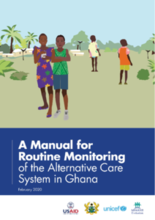Abstract:
Globally, there are multiple efforts to reform child welfare systems to promote better care for children, with attention to preventing unnecessary separation of children from their families and ensuring the provision of alternative care for children deprived of parental care. In Ghana, the need for a strong monitoring and evaluation (M&E) system has been identified as necessary to provide timely, reliable, and accurate information to assess whether approaches and interventions are effective, to improve accountability and learning, and to inform planning and monitoring decisions about policies and programs. For example, data on children in formal alternative care can help identify the need for new childcare services and allow policymakers and service providers to make evidence-based decisions about care to better design and manage care reform programs, resulting in better outcomes for children.
The purpose of this manual is to provide guidance on how to collect and report data on children in formal alternative care in a standardised way, and to analyse, present, and make the data available for use. The manual describes the necessary data management procedures, and the roles and responsibilities of different stakeholders for generating high-quality data on alternative care. The guidelines present a range of indicators for alternative care, the sources of information, the frequency of reports on alternative care, and monitoring and review structures. As with all M&E manuals, it is intended to be a working document.

